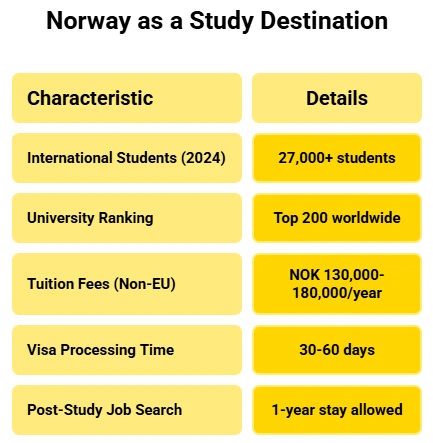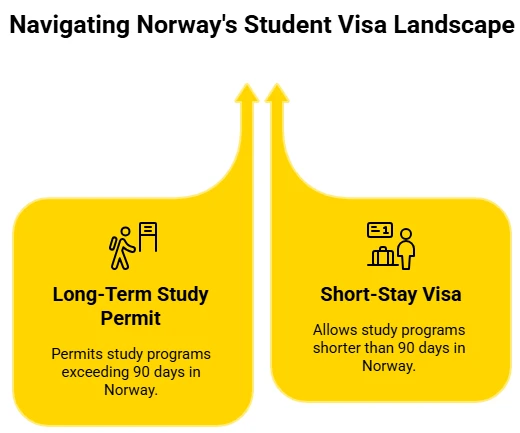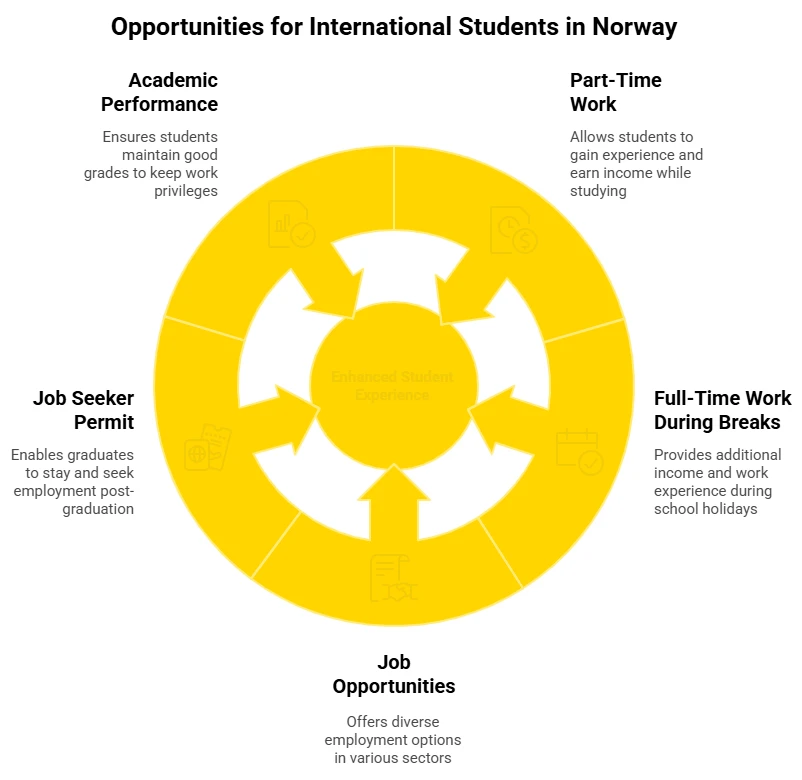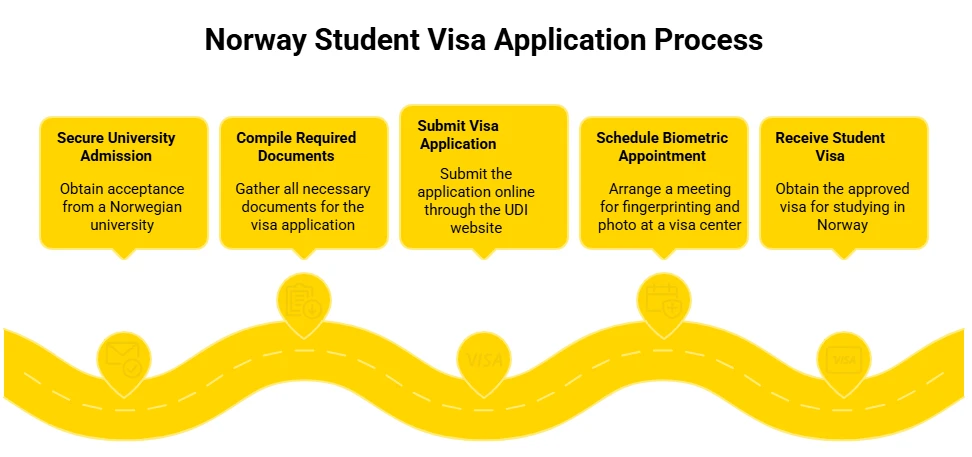Study in Norway
Don't know what to do?
Get Free Counselling
Study in Norway from Canada – Everything You Need to Know
Norway is becoming a popular choice for Canadian students interested in good education, different cultures, and job chances after school. Its universities are ranked well across the world and focus on coming up with new ideas. Studying in Norway may lead to great school and job opportunities.
- In 2024, Norway had over 27,000 students from other countries. This number is expected to reach 35,000 by 2026 (Study in Norway).
- Norwegian universities are regularly placed in the top 200 worldwide (QS World Rankings).
- Since 2023, most students from outside the EU pay school fees that go from NOK 130,000 to 180,000 each year (CAD 16,000–22,000).
- It usually takes 30 to 60 days for Canadian students to get their visas (UDI).
- After school, graduates can stay in Norway for up to one year to find a job.

*Want guidance to apply for a Norway Student Visa? Sign up with Y-Axis for comprehensive support with the process.
Why Study in Norway?
Norway is an ideal place for students to get a higher education. The country is known for good schools, new ideas, and a high quality of life. Universities there are known around the world and have many programs in English. Students can get a great education and be in a safe, welcoming, and green place. Norway lets foreign students work some while in school and has ways for them to get jobs after they graduate, which makes it a good choice for people who want to work anywhere in the world.
- Degree programs taught in English with global recognition.
- A secure, welcoming community focused on environmental care.
- Possibilities for students to work while studying, plus career options after graduation.
- An engaging cultural life set in beautiful natural areas.
- A commitment to new ideas and industries that are globally important.
Types of Student Visas for Norway
The popular types of Norway student visas are:
- Study Permit for Long-Term Programs (Over 90 Days)
- Short-Stay Visa (For Programs Less Than 90 Days)

Study Permit for Long-Term Programs (Over 90 Days)
International students who want to study in Norway for longer than 90 days need to get a student residence permit. This is a must for degree programs like bachelor's, master's, or doctoral studies, and any other courses that last over three months. To apply, you'll need an acceptance letter from a Norwegian school that's recognized. You also need to show you have enough money to live on—at least NOK 137,907 per year as of 2025. Plus, you'll have to provide proof of where you're staying and that you have health insurance that is good to go. This permit lets students work up to 20 hours a week while studying and full-time during breaks.
Short-Stay Visa (For Programs Less Than 90 Days)
Foreign students going to Norway for short programs, like summer schools or language courses lasting up to 90 days, might need a short-stay Schengen visa. This visa allows entry into Norway and other Schengen countries for study during that time. Even though Canadians can visit Norway without a visa for tourism or business for up to 90 days, students in academic programs may still need to show certain documents. These could include proof of acceptance, where they will be staying, travel insurance, and proof that they have enough money for their visit. It’s important to check these needs ahead of time to follow Norwegian immigration rules.
Work Rights With a Norway Student Visa
In Norway, international students holding a valid residence permit can work part-time, gaining global work experience as they study.
- During school semesters, students can work up to 20 hours each week. They can work full-time during official school breaks without needing another work permit.
- Part-time pay averages between NOK 180 to 220 hourly (around CAD 22–27 in 2025).
- Many international students find jobs in hospitality, retail, or as university assistants. These jobs provide hours that fit around class schedules.
- After finishing their studies, graduates can apply for a 12-month Job Seeker Residence Permit. This lets them stay in Norway and seek jobs.
- Popular fields for international graduates are IT, engineering, renewable energy, and healthcare. These areas provide good pay and chances for permanent residency.
Students need to keep up their grades to keep their work privileges, ensuring they focus on both their studies and their jobs.

Eligibility Criteria for Norway Student Visa
To be eligible for a student residence permit in Norway, Canadian students have these requirements:
- A letter of admission is needed from an approved Norwegian school.
- Proof of funds to cover living costs is needed (a minimum of NOK 137,907 each year, about CAD 16,800 in 2025).
- Proof of secure housing in Norway during the studies is necessary.
- If the school requires it, proof of English skills (IELTS, TOEFL, or similar scores) is needed.
- Valid health insurance for use in Norway is a must.
- A Canadian passport that will still be valid for at least six months after the planned stay is required.
Requirements to Apply for a Norway Student Visa
When applying for a Norway Student Visa, candidates need to provide the items listed below:
- A current passport.
- An acceptance letter from a Norwegian higher education institution.
- Proof of where you will be staying in Norway.
- Paperwork that confirms you have enough money.
- Health insurance that works in Norway.
How to Apply for a Norway Student Visa From Canada?
The process to apply for a Norway Student visa is given below.
Step 1: Secure admission in an accredited Norwegian university.
Step 2: Compile all the required documents for a Norway student visa.
Step 3: Submit your student visa application on the UDI website.
Step 4: Schedule a meeting to give your fingerprints and photo at the closest visa center.
Step 5: Receive your Norway Student Visa.

Cost of Studying in Norway for Canadian Students
The cost of studying in Norway is given below.
| Expense Type | Cost (NOK) | Approximate Cost in CAD (2025) |
|---|---|---|
| Tuition Fees | 130,000 – 180,000 per year | CAD 16,000 – 22,000 |
| Living Expenses | 12,000 – 14,000 per month | CAD 1,450 – 1,700 |
| Visa Fees | 5,300 (one-time) | CAD 620 |
Norway Student Visa Processing Time for Canadians
Detailed information about the processing times for the Norway Student Visa is given below.
| Visa Type | Processing Time |
|---|---|
| Study Permit for Long-Term Programs (Over 90 Days) | 30 – 60 days (may take up to 90 days during peak season) |
| Short-Stay Visa (For Programs Less Than 90 Days) | 15 – 30 days (depending on application volume) |
Scholarships and Financial Aid for Canadians Studying in Norway
Some of the scholarships offered by Norway are given below.
| Scholarship/Funding Option | Details |
|---|---|
| Norwegian Government Quota Scheme | Provides financial support for international students from select countries; limited seats available for Canadians. |
| ERASMUS+ Mobility Grants | Available for exchange students at participating Norwegian institutions; covers travel and living costs. |
| University-Specific Scholarships | Many Norwegian universities offer scholarships for international master’s and PhD students; eligibility varies. |
| Research Council of Norway Grants | Funding for students pursuing research-based programs in Norway. |
| Private and Institutional Grants | Additional funding opportunities are offered by private organizations and Canadian institutions partnering with Norway. |
Post-Study Work Opportunities in Norway
Graduates from foreign countries who complete degrees at Norwegian higher education institutions are able to apply for a Job Seeker Residence Permit. This permit allows them to remain in Norway for up to a year to find relevant work. It aids the move from being a student to working in Norway and gaining an international work background.
The Norwegian job market needs skilled people in tech, sustainable energy, healthcare, and engineering. After graduates get a job, they can apply for a Skilled Worker Residence Permit, which may lead to permanent residency.
How Can Y-Axis Help You?
Y-Axis offers guidance to students in Canada who want to study overseas. Our experience and global network allows us to give complete support, so your move to Norway is smooth and worry-free.
We can help you by:
- Giving custom advice on choosing a Norwegian university and program.
- Helping you with student visa applications and documentation.
- Aiding you in preparing proof of funds and meeting what the embassy requires
- Giving you orientation before you go, so you know about life and study in Norway.
- Offering advice on work chances and career plans after you graduate.
Frequently Asked Questions
